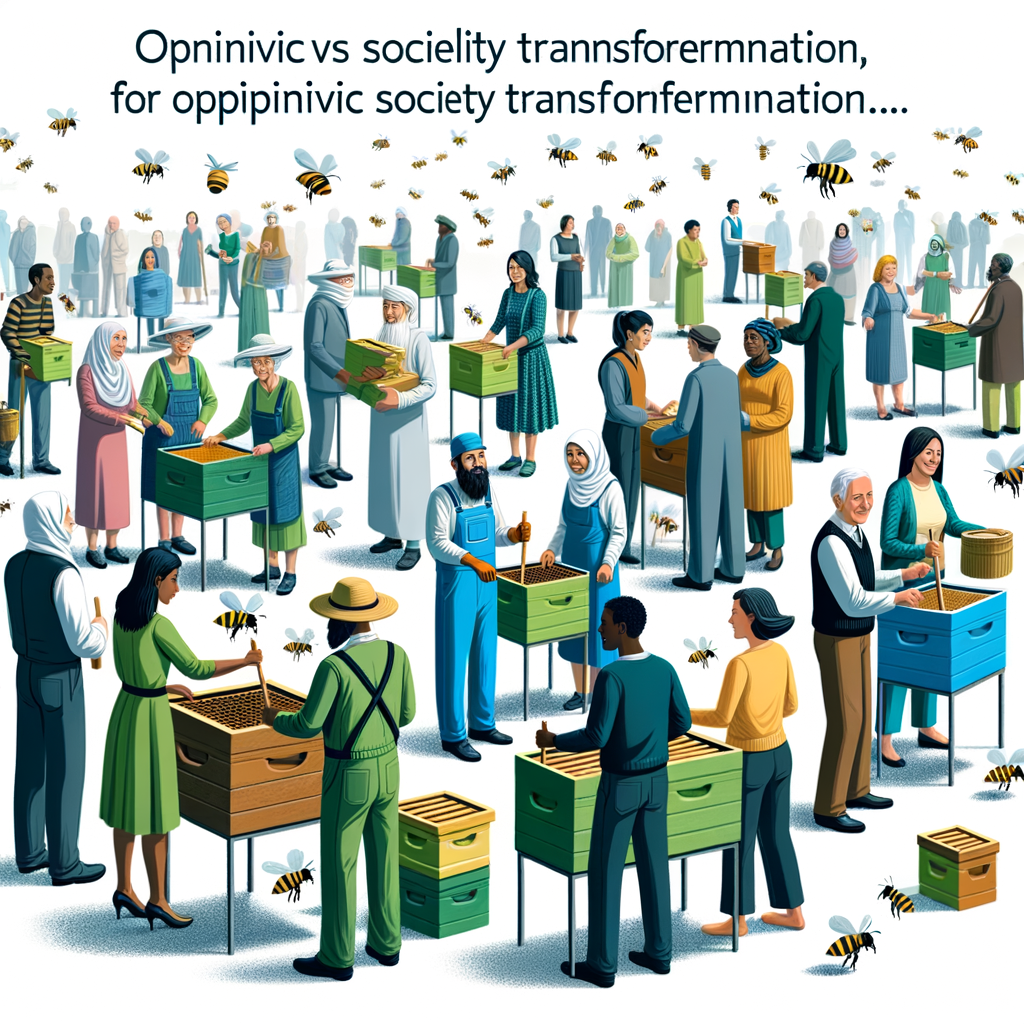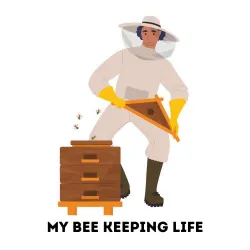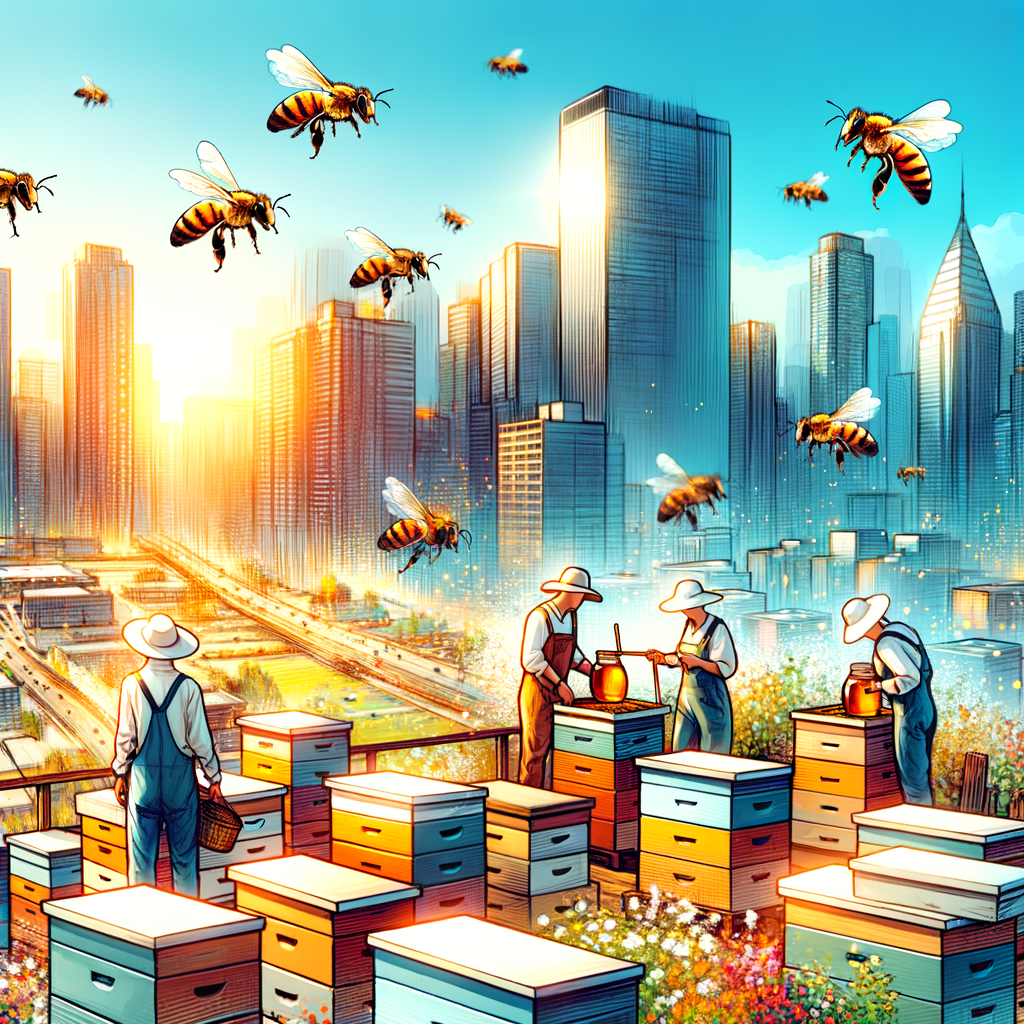
Introduction to Beekeeping and Social Development
As we delve into the fascinating world of beekeeping, we will uncover its profound impact on social development. This introduction will help you understand the concept of beekeeping and explore its link to social development.
- Understanding the concept of beekeeping
- Exploring the link between beekeeping and social development
Beekeeping, also known as apiculture, is the practice of maintaining bee colonies, usually in man-made hives. This ancient practice dates back to at least 15,000 years ago, as depicted in early cave paintings. Beekeepers manage their hives to produce honey and other products like beeswax, pollen, and royal jelly. But beekeeping is not just about honey production. It also plays a crucial role in pollinating our crops and maintaining biodiversity.
Beekeeping has a significant impact on social development. It offers a sustainable source of income for many rural and developing communities, improving their economic status. Moreover, beekeeping encourages cooperation and community engagement, fostering social cohesion. It also promotes gender equality as it offers equal opportunities for both men and women. In addition, beekeeping contributes to food security and biodiversity, which are essential for sustainable development.
In the following sections, we will delve deeper into the benefits of beekeeping, its role in social development, and how it contributes to sustainable development. We will also explore how beekeeping can drive social change and economic development, and discuss its social impact. Finally, we will look at the future of beekeeping for social development.
Beekeeping Benefits
When we think about beekeeping, we often picture a beekeeper in a protective suit, tending to their hives. But beekeeping is more than just a hobby or a job. It’s a practice that offers numerous benefits, not just to the beekeeper, but also to the environment, the economy, and society as a whole. Let’s explore these benefits in detail.
- Environmental benefits of beekeeping
- Economic benefits of beekeeping
- Social benefits of beekeeping
Beekeeping plays a crucial role in preserving our environment. Bees are known as nature’s most efficient pollinators. They help in the pollination of a wide variety of plants, contributing to biodiversity. This process is essential for the growth of fruits, vegetables, and nuts that we consume daily. Without bees, our food system would be severely impacted. In addition, beekeeping encourages the preservation of green spaces and reduces the use of harmful pesticides, contributing to a healthier environment.
Beekeeping can also be a source of income and economic growth. Honey and other bee products like beeswax, pollen, and royal jelly are in high demand globally. According to the National Honey Board, the honey industry contributed more than $4.7 billion to the U.S. economy in 2017. Furthermore, beekeeping can be a cost-effective business as it requires minimal initial investment and can be done on a small scale, making it accessible to individuals and communities with limited resources.
Socially, beekeeping can bring communities together. It can be a shared activity that fosters cooperation, learning, and mutual support. Beekeeping can also be therapeutic and help reduce stress. According to a study conducted by the Veterans Affairs Medical Center, beekeeping has been shown to have positive effects on mental health, reducing symptoms of post-traumatic stress disorder and depression. Moreover, beekeeping can educate people about the importance of bees and the environment, promoting a culture of sustainability and conservation.
In conclusion, beekeeping is not just about producing honey. It’s a practice that benefits our environment, boosts our economy, and strengthens our communities. As we continue to face environmental and social challenges, beekeeping offers a sustainable and beneficial solution.
Social Development through Beekeeping
Beekeeping is not just about honey production. It’s a powerful tool that can bring about social change and development. Let’s explore how beekeeping can empower individuals and promote self-sufficiency.
Empowerment and Self-Sufficiency
When we talk about empowerment and self-sufficiency, we mean giving people the tools and knowledge they need to take care of themselves and their communities. Beekeeping is one such tool.
- How beekeeping promotes self-sufficiency
- Case study: Beekeeping for women empowerment
Beekeeping is a skill that anyone can learn, regardless of their background or education. It requires minimal resources to start and maintain. The honey and other bee products can be sold for income, used for personal consumption, or used as gifts. This means that beekeepers can support themselves and their families without relying on others. Plus, the skills learned in beekeeping can be passed down to future generations, promoting long-term self-sufficiency.
Let’s look at a real-life example. In rural parts of Kenya, a project called ‘Honey Care Africa’ has been empowering women through beekeeping. The women are trained in beekeeping skills and given the necessary equipment. They then start their own beekeeping businesses, selling honey and other bee products. This not only provides them with a steady income but also boosts their confidence and status in the community. This case study shows how beekeeping can be a powerful tool for women’s empowerment and self-sufficiency.
In conclusion, beekeeping can play a significant role in promoting empowerment and self-sufficiency. It’s a skill that can be learned by anyone, and it can provide a steady source of income. Plus, it can boost confidence and status in the community, particularly for women. So, let’s spread the word about the social benefits of beekeeping!
Community Development
Community development is a crucial aspect of social growth. One surprising yet effective method of fostering community development is through beekeeping. Let’s delve into the role of beekeeping in community bonding and explore some successful community beekeeping projects.
- Role of Beekeeping in Community Bonding
- Case Study: Community Beekeeping Projects
Beekeeping is more than just a hobby or a source of income; it can be a powerful tool for community bonding. It encourages cooperation, shared learning, and a sense of collective responsibility. Beekeepers often work together to manage hives, share knowledge, and even sell honey. This shared endeavor can bring people together, fostering a sense of community and mutual support.
Moreover, beekeeping can also promote environmental awareness within the community. As members learn about the vital role bees play in our ecosystem, they become more conscious of their actions and their impact on the environment. This shared understanding and commitment can strengthen community bonds.
There are numerous examples of successful community beekeeping projects worldwide. One such example is the Honeybee Conservancy’s Sponsor-a-Hive program in the United States. This program provides bees and equipment to communities across the country, helping them start their own beekeeping projects.
Since its inception, the Sponsor-a-Hive program has helped establish over 300 community beekeeping projects. These projects have not only produced honey but also fostered community bonding and environmental awareness. The success of this program underscores the potential of beekeeping as a tool for community development.
In conclusion, beekeeping can play a significant role in community development. It fosters community bonding, promotes environmental awareness, and can even provide a source of income. As we continue to explore the social benefits of beekeeping, it’s clear that this humble practice has the potential to make a big impact.
Sustainable Beekeeping
As we delve into the world of beekeeping, it’s crucial to understand the importance of sustainable practices. These practices not only ensure the longevity of our bee populations but also contribute to the overall health of our environment. Let’s explore some of the key practices for sustainable beekeeping.
Practices for Sustainable Beekeeping
There are several practices that can help us achieve sustainable beekeeping. These include responsible beekeeping, organic beekeeping, and conservation beekeeping. Each of these practices plays a unique role in promoting the health and survival of bees.
- Responsible Beekeeping
- Organic Beekeeping
- Conservation Beekeeping
Responsible beekeeping is all about understanding and respecting the needs of the bees. This involves providing them with a safe and healthy environment, ensuring they have access to a diverse range of flowers for nutrition, and protecting them from harmful pesticides and diseases. It’s about making decisions that are in the best interest of the bees, rather than just focusing on honey production.
Organic beekeeping takes responsible beekeeping a step further by completely eliminating the use of synthetic chemicals in the beekeeping process. This means using natural methods to control pests and diseases, and ensuring that the bees have access to organic flowers for foraging. Organic beekeeping helps to preserve the natural behavior and health of the bees, leading to a more sustainable bee population.
Conservation beekeeping is focused on protecting and preserving wild bee populations. This involves creating habitats that are conducive for wild bees, promoting the growth of native plants that bees love, and advocating for policies that protect bees and their habitats. Conservation beekeeping recognizes the critical role that wild bees play in our ecosystem and strives to protect them.
In conclusion, sustainable beekeeping is a multifaceted approach that requires a deep understanding and respect for bees and their needs. By adopting responsible, organic, and conservation beekeeping practices, we can help ensure the survival of our precious bee populations and contribute to a healthier planet.
Impact of Sustainable Beekeeping
Sustainable beekeeping has a profound impact on our environment. It plays a significant role in the preservation of bee species and contributes to biodiversity. Let’s delve into these aspects in detail.
- Preservation of Bee Species
Bee species are under threat globally due to various factors like habitat loss, climate change, and pesticides. Sustainable beekeeping practices are a beacon of hope in preserving these vital pollinators. They ensure that bees are kept in conditions that mimic their natural habitats, reducing stress and promoting their health.
For instance, in responsible beekeeping, beekeepers avoid the use of harmful chemicals that can harm bees. They also ensure that bees have enough honey left for their own consumption during winters. These practices help in maintaining healthy bee colonies, thus aiding in the preservation of bee species.
- Contribution to Biodiversity
Biodiversity refers to the variety of life on Earth, and bees play a crucial role in maintaining it. Bees are excellent pollinators, helping in the reproduction of plants. Without bees, many plant species would struggle to reproduce, leading to a decline in biodiversity.
Sustainable beekeeping encourages the growth and health of bee populations. A healthy bee population means more pollination, leading to a diverse range of plants. This, in turn, supports a variety of wildlife, contributing to a rich and balanced ecosystem.
In conclusion, sustainable beekeeping is not just about honey production. It’s about preserving our environment and maintaining the delicate balance of our ecosystems. By adopting sustainable practices, we can ensure the survival of bee species and contribute to biodiversity.
Beekeeping and Social Change
When we think about bees, we often imagine them buzzing around flowers, collecting nectar, and making honey. But did you know that beekeeping plays a significant role in driving social change? Let’s dive into how beekeeping can transform societies and contribute to rural development.
- How beekeeping can drive societal change
- Role of beekeeping in rural development
Beekeeping is more than just producing honey. It’s about creating a sustainable environment and promoting social change. Bees play a crucial role in pollinating plants, which helps to grow more food. More food means less hunger, and less hunger leads to a healthier and more productive society.
Furthermore, beekeeping can provide a source of income for individuals and families. This can help to reduce poverty and improve living standards. In fact, a study by the United Nations found that beekeeping has helped to lift thousands of people out of poverty in rural areas around the world.
Beekeeping can play a significant role in rural development. In many rural areas, agriculture is the main source of income. Bees can help to increase crop yields through pollination, which can boost income for farmers.
Moreover, beekeeping requires minimal space and resources, making it an accessible and affordable option for many people. It can also provide a source of food and income during times when crops are not in season.
Finally, beekeeping can help to preserve biodiversity and promote a healthy ecosystem. This is essential for sustainable rural development.
In conclusion, beekeeping is not just about bees and honey. It’s about creating a sustainable and equitable world. So next time you see a bee buzzing around, remember the important role it plays in driving social change and promoting rural development.
Beekeeping for Economic Development
Beekeeping, also known as apiculture, is not just a hobby. It can also be a profitable business that contributes to economic development. Let’s explore how beekeeping can generate income and open up market opportunities.
Income Generation through Beekeeping
Beekeeping can be a source of income in two main ways: through the profitability of beekeeping itself and through the market opportunities for bee products.
- Profitability of Beekeeping
- Market Opportunities for Bee Products
Beekeeping can be a profitable venture. The cost of starting a beekeeping business can be relatively low, especially if you start small. The income generated from selling honey and other bee products can be substantial. According to a study, a single hive can produce up to 100 pounds of honey a year. If you sell that honey for $7 a pound, that’s $700 per hive per year. Imagine the income potential if you have multiple hives!
Bee products are not limited to honey. Bees also produce beeswax, propolis, and royal jelly, all of which have their own market opportunities. Beeswax can be used in candles, cosmetics, and food. Propolis has medicinal properties and is used in health supplements. Royal jelly is a health food and beauty product. The market for these products is growing, providing more opportunities for income generation.
In conclusion, beekeeping can be a profitable business that contributes to economic development. Not only does it generate income, but it also opens up market opportunities for a variety of bee products. So, if you’re considering starting a beekeeping business, know that you’re not only helping the bees, but you’re also contributing to the economy.
Beekeeping as a Source of Employment
One of the most significant benefits of beekeeping is its potential to create jobs and foster economic development. This is particularly true in areas where traditional employment opportunities may be scarce. Let’s delve into how beekeeping can be a source of employment.
-
Job creation through beekeeping
Beekeeping is a labor-intensive activity that requires a variety of roles to be filled. These include beekeepers, who manage the hives and care for the bees, and honey extractors, who collect the honey and prepare it for sale. Additionally, there are roles in marketing and sales, as well as in the production of bee-related products such as candles, soaps, and cosmetics. According to a study, in rural areas where job opportunities are limited, beekeeping can provide a significant source of income and employment.
-
Case study: Beekeeping for youth employment
Let’s take a look at a case study that demonstrates the potential of beekeeping for job creation. In a rural community in Uganda, a youth employment program introduced beekeeping as a way to combat high unemployment rates among young people. The program trained participants in beekeeping skills and provided them with the necessary equipment to start their own beekeeping businesses. As a result, many of the participants were able to generate a steady income from selling honey and other bee products, thereby creating a sustainable source of employment.
In conclusion, beekeeping can be a viable source of employment, particularly in areas where job opportunities are limited. By providing a source of income and a path to self-sufficiency, beekeeping can play a significant role in economic development and social improvement.
Social Impact of Beekeeping
Beekeeping is more than just a hobby or a means to produce honey. It has a profound social impact, particularly in terms of improving livelihoods and reducing poverty. Let’s delve into these aspects in more detail.
- Improving Livelihoods through Beekeeping
Beekeeping, also known as apiculture, can significantly improve the livelihoods of people, especially in rural areas. It provides a source of income that is not only sustainable but also environmentally friendly. The beauty of beekeeping is that it requires minimal investment and land, making it accessible to many.
By selling honey and other bee products like beeswax, pollen, and royal jelly, individuals can generate a steady income. This income can help pay for essentials like food, education, and healthcare. Additionally, beekeeping promotes biodiversity and helps to maintain a healthy ecosystem, which in turn supports agriculture and food production.
- Case Study: Beekeeping for Poverty Reduction
Let’s look at a real-life example of how beekeeping can help reduce poverty. In the rural areas of Tanzania, a project was initiated to train local communities in beekeeping. The project provided the necessary equipment and training to start their own beekeeping ventures.
The results were astounding. The communities were able to generate a regular income from selling honey and other bee products. This income not only helped them meet their daily needs but also allowed them to invest in other income-generating activities. The project was a success and clearly demonstrated how beekeeping can be a powerful tool for poverty reduction.
In conclusion, the social impact of beekeeping is far-reaching. It not only improves livelihoods but also contributes to poverty reduction. It’s a testament to the power of small actions and their potential to bring about significant social change.
Beekeeping and Sustainable Development
Beekeeping, also known as apiculture, has a significant role in promoting sustainable development. It contributes to biodiversity, supports the livelihoods of rural communities, and aids in food security. Let’s delve into the details of how beekeeping contributes to sustainable development goals and what the future holds for this practice.
- Contribution of Beekeeping to Sustainable Development Goals
- No Poverty: Beekeeping can be a source of income for many rural households, helping to alleviate poverty.
- Zero Hunger: Bees play a crucial role in pollination, which is vital for food production and, consequently, food security.
- Life on Land: Bees contribute to maintaining biodiversity by pollinating a wide variety of plants, including many that make up the world’s forests.
- Future of Beekeeping for Sustainable Development
- Increased Awareness: There is a growing awareness about the importance of bees and the need to protect them. This is likely to lead to more sustainable beekeeping practices.
- Technological Advancements: Technology can help in monitoring bee health and improving beekeeping practices, thereby contributing to sustainable development.
- Policy Support: Governments around the world are beginning to recognize the importance of bees for sustainable development and are likely to implement policies that support beekeeping.
Beekeeping contributes to several Sustainable Development Goals (SDGs) set by the United Nations. Here are a few key points:
The future of beekeeping for sustainable development looks promising. With the increasing recognition of the importance of bees for biodiversity and food security, more initiatives are being taken to promote beekeeping. Here are some future prospects:
In conclusion, beekeeping has a significant role to play in achieving sustainable development goals. With increased awareness, technological advancements, and policy support, the future of beekeeping for sustainable development looks bright.
Beekeeping for Societal Improvement
In this section, we will delve into the significant role that beekeeping plays in societal improvement. We will also look at a case study that demonstrates how beekeeping can be used for social inclusion.
- Role of Beekeeping in Societal Improvement
- Case Study: Beekeeping for Social Inclusion
Beekeeping is not just about producing honey and other bee products. It also plays a crucial role in societal improvement. Bees are responsible for pollinating about one-third of the food we eat, which makes them indispensable to our food system. By keeping bees, we help to maintain and increase bee populations, thereby ensuring food security.
Beekeeping also provides income opportunities for people in both urban and rural areas. It requires minimal space and investment, making it accessible to many people. This can help to reduce poverty and improve living standards.
Moreover, beekeeping promotes biodiversity. Bees play a critical role in pollinating plants, including those in the wild. By keeping bees, we help to maintain and enhance biodiversity, which is vital for a healthy and resilient ecosystem.
Let’s look at a case study that illustrates how beekeeping can be used for social inclusion. In a project in Brazil, beekeeping was introduced to a community of people with disabilities. The project aimed to provide these individuals with income opportunities and to promote their social inclusion.
The participants were trained in beekeeping and given the necessary equipment. They started producing honey, which they sold in local markets. The project was a success, with participants reporting increased income and improved self-esteem. They also felt more included in their community as they were contributing to its economy and food security.
This case study shows that beekeeping can be a powerful tool for social inclusion. It can provide people with income opportunities and a sense of purpose, and it can help to break down barriers and promote social cohesion.
In conclusion, beekeeping has a significant role to play in societal improvement. It can contribute to food security, income generation, biodiversity, and social inclusion. As such, it is a practice that deserves our support and promotion.
Conclusion: The Future of Beekeeping for Social Development
As we delve into the final section of our discussion, we will summarize the key points we’ve covered and look towards the future of beekeeping for social development. The world of beekeeping holds vast potential for societal improvement, economic development, and sustainable practices. Let’s wrap up our exploration of this fascinating topic.
- Key Takeaways
- Beekeeping fosters economic development by creating job opportunities and generating income through honey and other bee products.
- It contributes to social change by empowering marginalized communities and promoting gender equality.
- Beekeeping plays a crucial role in sustainable development, helping to maintain biodiversity and ecological balance.
- It also aids in societal improvement by encouraging community participation and cooperation.
- Future Prospects of Beekeeping for Social Development
- Increased adoption of sustainable beekeeping practices, contributing to environmental conservation and climate change mitigation.
- Greater recognition of beekeeping as a tool for social development, leading to more support and funding from governments and international organizations.
- Expansion of beekeeping initiatives in developing countries, helping to alleviate poverty and improve livelihoods.
- Continued research into the benefits of beekeeping, leading to new insights and innovations.
Throughout this article, we’ve discovered the profound impact beekeeping can have on social development. Here are the key points to remember:
Looking ahead, the future of beekeeping for social development is promising. Here are some potential developments we might see:
In conclusion, beekeeping is more than just a hobby or a means of producing honey. It’s a powerful tool for social development, capable of transforming lives and communities. As we move forward, let’s continue to explore and harness the potential of this remarkable practice.








